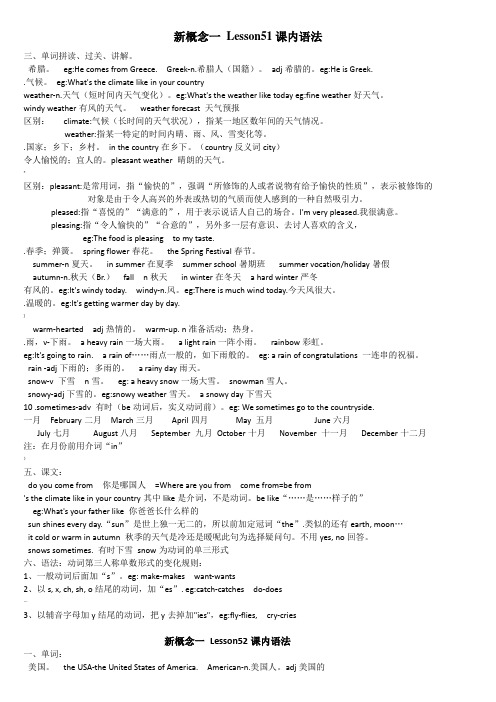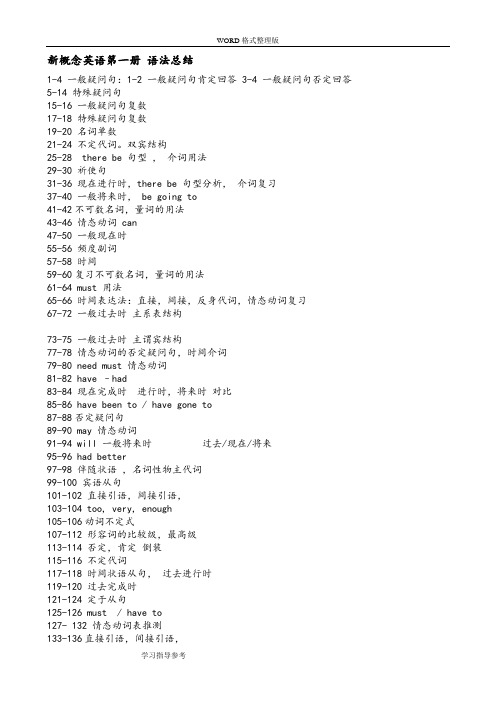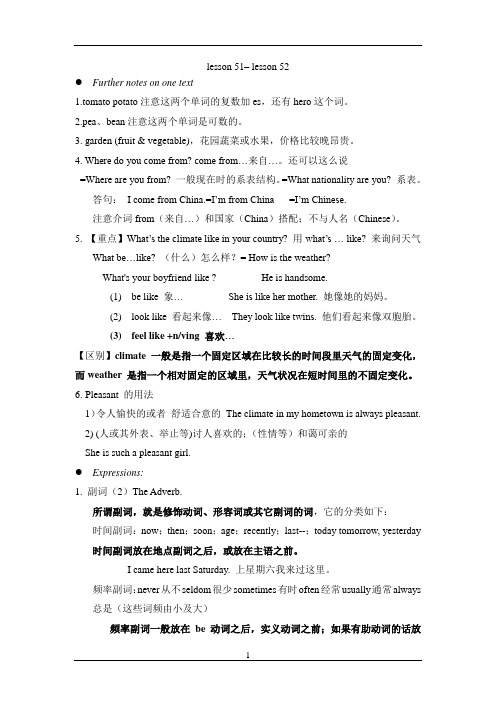新概念英语第一册Lesson51~56重点语法
- 格式:doc
- 大小:30.50 KB
- 文档页数:6

新概念一Lesson51课内语法三、单词拼读、过关、讲解。
希腊。
eg:He comes from Greece. Greek-n.希腊人(国籍)。
adj希腊的。
eg:He is Greek..气候。
eg:What's the climate like in your countryweather-n.天气(短时间内天气变化)。
eg:What's the weather like today eg:fine weather好天气。
windy weather有风的天气。
weather forecast 天气预报区别:climate:气候(长时间的天气状况),指某一地区数年间的天气情况。
weather:指某一特定的时间内晴、雨、风、雪变化等。
.国家;乡下;乡村。
in the country在乡下。
(country反义词city)令人愉悦的;宜人的。
pleasant weather 晴朗的天气。
*区别:pleasant:是常用词,指“愉快的”,强调“所修饰的人或者说物有给予愉快的性质”,表示被修饰的对象是由于令人高兴的外表或热切的气质而使人感到的一种自然吸引力。
pleased:指“喜悦的”“满意的”,用于表示说话人自己的场合。
I'm very pleased.我很满意。
pleasing:指“令人愉快的”“合意的”,另外多一层有意识、去讨人喜欢的含义,eg:The food is pleasing to my taste..春季;弹簧。
spring flower春花。
the Spring Festival春节。
summer-n夏天。
in summer在夏季summer school暑期班summer vocation/holiday暑假autumn-n.秋天(Br.)fall n秋天in winter在冬天 a hard winter严冬有风的。
eg:It's windy today. windy-n.风。


新概念英语第一册语法总结1-4 一般疑问句:1-2 一般疑问句肯定回答 3-4 一般疑问句否定回答5-14 特殊疑问句15-16 一般疑问句复数17-18 特殊疑问句复数19-20 名词单数21-24 不定代词。
双宾结构25-28 there be 句型,介词用法29-30 祈使句31-36 现在进行时,there be 句型分析,介词复习37-40 一般将来时, be going to41-42不可数名词,量词的用法43-46 情态动词 can47-50 一般现在时55-56 频度副词57-58 时间59-60复习不可数名词,量词的用法61-64 must 用法65-66 时间表达法:直接,间接,反身代词,情态动词复习67-72 一般过去时主系表结构73-75 一般过去时主谓宾结构77-78 情态动词的否定疑问句,时间介词79-80 need must 情态动词81-82 have –had83-84 现在完成时进行时,将来时对比85-86 have been to / have gone to87-88否定疑问句89-90 may 情态动词91-94 will 一般将来时过去/现在/将来95-96 had better97-98 伴随状语,名词性物主代词99-100 宾语从句101-102 直接引语,间接引语,103-104 too, very, enough105-106动词不定式107-112 形容词的比较级,最高级113-114 否定,肯定倒装115-116 不定代词117-118 时间状语从句,过去进行时119-120 过去完成时121-124 定于从句125-126 must / have to127- 132 情态动词表推测133-136直接引语,间接引语,137-138 条件状语从句139-140宾语从句141-144 被动语态Lesson 1 Excuse me1. Words1) excuse (1)重音(2)与sorry 的区别(3)Excuse 用的不同场景a. 请别人让路b. 引起别人的注意c. 打断别人的谈话d. 可以当n. 借口 eg. No excuse. 别找借口,没有借口。

Lesson 51-52课文详注Further notes on the text1.Where do you come from? 你是哪国人?问对方是什么地方人。
come from表示来源或籍贯。
也可说:Where are you from? 在第7课中出现过类似的句子。
2.What's the climate like in your country? 你们国家的气候怎么样?句中like是介词,不是动词,它的宾语是What。
又如:What's the weather like in spring? climate指某一地区数年间的天气情况;weather是指某个特定的时间内晴、雨、风、雪变化。
对于这类问题的回答可以是It's very pleasant(很好)或It rains sometimes(有时下雨)。
这里的it均指天气。
3.It's often windy in March. 3月里常常刮风。
表示在某个月份里通常用介词in。
类似用in的时间短语课文中还有in April(在4月),in June(在6月),in September(在9月)等等。
often(经常),always(总是,老是),sometimes(有时)都是课文中出现的表示非确定频度的副词。
这些副词一般用来回答用how often 提问的问题。
语法Grammar in useWhat…(be. look, etc.) like? 我们把What…like? 这一句型用于询问事物的状况,例如天气、气候等:What's the weather like today? 今天天气怎么样?What's it like today? 今天怎么样?What's the climate like in your country? 你们国家气候怎么样?或询问人物或事物的外观或特征:What's your brother like? 你兄弟是个什么样子?What's your house like? 你的房子是什么样的?许多形容词可用以回答What…like? 这样的问题,并可根据上下文给以笼统的或确切的信息。

新概念英语第一册语法整理点通含全套笔记单词课程设置1、理顺新概念第一册语法点2、掌握20个元音、28个辅音的读和写3、新概念第二册作业辅导新概念一共144课,其中单课为课文,双课为语法和练习。
整本书是以单数课为正课,并附带有插图而双数课则是针对单数课所讲的内容有针对性地进行练习。
首先根据课本中出现的时态来分析:本册书的语法出现层次性和规律性是很强的,首先我们先来整本书中都出了哪些时态,这些时态的具体分布和讲解时我们大家需要注意的递进性。
Lesson 31—34 现在进行时Lesson 37—40 第一次出现be going to 的将来时Lesson 51—56 一般现在时Lesson 67—76 一般过去式Lesson 83—90 现在完成时Lesson 91—96 一般将来时(will)Lesson 117—118 过去进行时Lesson 119—120 过去完成时除去前面所有时态和句型所占据的76课我们一起来看一下以下的68课,每一课小的语言点,语法点都是在什么地方,应该用什么样的方式来讲解。
新概念一的每一个单课的重点都是出现双课的标题和课后的练习题里面。
Lesson1—2语言点:与陌生人说话或引起别人的注意。
Excuse me. Yes? Pardon? Thank you very much.语法点:主系表结构this为主语,名词做表语1的一般疑问句以及它的肯定回答。
Is this your handbag? Yes, it is.Lesson 5—6语言点:如何介绍别人。
This is Miss Sophie Dupont. Nice to meet you.语法点:主语为第三人称单数的主系表结构。
She is French. He is German. It’s a Volvo.(L6) a/an 的使用。
Lesson 7—8语言点:如何自我介绍和相互认识。
语法点:主语为第二人称的主系表结构。

lesson 51– lesson 52●Further notes on one text1.tomato potato注意这两个单词的复数加es,还有hero这个词。
2.pea、bean注意这两个单词是可数的。
3. garden (fruit & vegetable),花园蔬菜或水果,价格比较晚昂贵。
4. Where do you come from? come from…来自…。
还可以这么说=Where are you from? 一般现在时的系表结构。
=What nationality are you? 系表。
答句:I come from China.=I’m from China =I’m Chinese.注意介词from(来自…)和国家(China)搭配;不与人名(Chinese)。
5. 【重点】What’s the climate like in your country? 用what’s … like? 来询问天气What be…like? (什么)怎么样?= How is the weather?What's your boyfriend like ? He is handsome.(1) be like 象… She is like her mother. 她像她的妈妈。
(2) look like 看起来像… They look like twins. 他们看起来像双胞胎。
(3) feel like +n/ving 喜欢…【区别】climate 一般是指一个固定区域在比较长的时间段里天气的固定变化,而weather 是指一个相对固定的区域里,天气状况在短时间里的不固定变化。
6.Pleasant 的用法1)令人愉快的或者舒适合意的The climate in my hometown is always pleasant.2) (人或其外表、举止等)讨人喜欢的;(性情等)和蔼可亲的She is such a pleasant girl.●Expressions:1. 副词(2)The Adverb.所谓副词,就是修饰动词、形容词或其它副词的词,它的分类如下:时间副词:now;then;soon;age;recently;last--;today tomorrow, yesterday 时间副词放在地点副词之后,或放在主语之前。
Lesson 51-551. What's the climate like in your country? (L.51)2. I'm Australian. I come from Australia. (L.54)3. The Sawyers live at 87 King Street? (L.55)4. She always eats her lunch at noon. (L. 55)语法扩展1.特殊疑问句型:what…like?特殊疑问句型what…like中,like不是动词,而是介词,意思是“像……”,what作该介词的宾语。
这一句型常用于询问事物的状况,例如天气、气候等。
如:What's the weather like today?What's the climate like in your country?这一句型也可以用来询问人或事物的外貌或特征。
如:What's your brother like?What's your house like?许多形容词都可以用来回答what…like? 这样的问题,并可以根据上下文给出笼统的或确切的信息。
例如回答有关天气的形容词有pleasant(宜人的),windy(多风的),hot(热的)等等。
2.表示国籍(或所属地区)的形容词和表示国家(或地区)的名词主系表结构中表示某人的国籍(或所属地区)的表语应用形容词形式,而不是名词。
国家名称变成形容词形式主要通过在词尾加后缀构成,常见的些类后缀有:-ian: Australia -Australian 澳大利亚的Italy-Italian 意大利的Canada -Canadian 加拿大的India-Indian印度的-ese: China-Chinese 中国的Japan-Japanese 日本的-ish: Denmark-Danish丹麦的Lebanon-Lebanese 黎巴嫩的-ish: Denmark -Polish波兰的Scotland -Scottish 苏格兰的3.定冠词+姓氏名词复数表示一家人定冠词the+姓氏名词的复数形式可以表示一家人。
新概念英语第一册课文翻译及学习笔记Lesson51~56新概念英语第一册课文翻译及学习笔记Lesson51~52 【课文】HANS: Where do you come from?DIMITRI: I come from Greece.HANS: What’s the climate like in your country?DIMITRI: It’s very pleasant.HANS: What’s the weather like in spring?DIMITRI: It’s often windy in March. It’s always warm in April and May, but it rains sometimes.HANS: What’s it like in summer?DIMITRI: It’s always hot in June, July and August. The sun shines every day.HANS: Is it cold or warm in autumn?DIMITRI: It’s always warm in September and October. It’s often cold in November and it rains sometimes.HANS: Is it very cold in winter?DIMITRI: It’s often cold in December, January and February. It snows sometimes.【课文翻译】汉斯:你是哪国人?迪米特里:我是希腊人。
汉斯:你们的国家的气候是怎么样?迪米特里:气候非常宜人。
汉斯:春季的天气怎么样?迪米特里:3月里常常刮风。
4月和5月的天气总暖洋洋的,但有时下雨。
汉斯:夏季的天气如何呢?迪米特里:6月、7月和8月的天气总是炎热的每天都出太阳。
新概念英语第一册笔记51-60新概念英语第一册笔记Lesson 51 Apleasant climate一、单词讲解1、GreeceGreece n. 希腊(国名)eg. Where does Jim come from?eg. Jim comes from Greece.eg. Where is Jim from?He’s from Greece.Greek n. 希腊人(国箱) adj. 希腊的eg. What nationality is Mr. White?He is Greek.eg. I am a Greek engineer.eg. Are they Greek doctors?Yes, they are.No, they aren’t.2、climateclimate n. 气候eg. What’s the climate like in your country? eg. I don’t like the climate here.3、countrycountry n. 国家eg. China is a big country.eg. Do you like this country?Yes, I do.4、pleasantpleasant1) adj. 天气宜人的eg. It’s quite pleasant today.2) adj. 令人愉悦的eg. What a pleasant surprise! 多么好的一个惊喜呀!eg. The flower gives off a pleasant smell. 这支花散发出一种令人愉悦的香味。
3)adj. 可亲的,友好的eg. Her mother is a pleasant woman.eg. Wendy is very pleasant.a pleasant smile4、weatherweather n. 天气(短时间内天气变化)climate n. 气候(长时间的天气状况)eg. What’s the weather like today?good weather 好天气=nice weatherweather forecast 天气预报weather bureau 气象局under the weather: not very well or happy 感觉不是很好或不是很高兴weather beaten:岁月侵蚀的,饱经风霜的the weather beaten rocks:风雨侵蚀的岩石a weather beaten face:沧桑的脸4、spring收集于网络,如有侵权请联系管理员删除spring1) n. 春季eg. My father likes spring.eg. Do you like spring?Yes, I do.No, I don’t.2) n. 弹簧5、windywindy adj. 有风的eg. What’s the weather like today?eg. It’s windy.wind n. 风eg. There is much wind today. 今天风很大。
新概念英语第一册Lesson51~56重点语法
新概念英语第一册Lesson51~52重点语法
一、重要句型或语法
1、一般现在时
1)表示天气,如:What’s the weather like in spring? It’s often windy in March.
2)表示气候,如:What’s the climate like in your country? It’s very pleasant.
3)it作主语,表天气或气候。
2、国籍的问答
Where do you come from? I come from Greece.
二、课文主要语言点
Where do you come from? I come from Greece. 也可以用:Where are you from? I am from Greece.
What’s the climate like in your country? / What’s the weather like in spring? 注意区分climate与weather:指某一地区总的气候情况,如干旱、湿润、温度、凉爽等;weather指某地某天的具体天气情况,如阴晴、降水、气温、风力、风向等。
It’s very pleasant. pleasant来源于please,表示“令人愉快的”。
在课文里用来修饰天气,表示“宜人的,
舒适的”。
It’s often windy in March. 此处可介绍表天气的名词及其形容词的变化,即在名词后加后缀-y。
此外,也可以介绍一年中12个月份的表达,可顺便介绍12个月的历史故事。
Its’ always warm in April and May, but it rains sometimes. 句中的sometimes一般位于助动词后面和实意动词前面,此处放在句末,主要是其强调作用。
What’s it like in summer? 句中的it指代天气。
The sun shines every day. 强调天体名称前要用定冠词the,用以表示独一无二的事物。
Is it cold or warm in autumn? It’s always warm in September and October. 复习选择疑问句的问答。
三、双课补充内容
1、操练句型:
1) What nationality are you? I’m American.
2) Where do you come from? I come from the US.
2、识记国名和国人:教材第103页和第104页生词表
3、数字:序数词20th-31st
新概念英语第一册Lesson53~54重点语法
一、重要句型或语法
1、一般现在时
1)表示天气,如:The weather’s often cold in the North and windy in the East.
2)表示气候,如:What’s the climate like in your country? It’s mild, but it’s not always pleasant.
3)季节喜好的问答,如:Which seasons do you like best? I like spring and summer.
2、国籍的问答
Where do you come from? I come from England.
二、课文主要语言点
I come from England. England表示“英格兰”,但在英语里经常用来指代整个英国。
It’s mild, but it’s not always pleasant. mild 表示“温和的;温暖的”。
可以让学生学习使用句型:It’s ...but it’s not always ...
The weather’s often cold in the North and windy in the East. 英语里,东南西北的表达需要梳理。
表方位时,要注意东南、东北、西南、西北的表达,英语里是:southeast, northeast, southwest, southeast。
此外,当方向首字母大写时,一般不再指方位,而是指地域,如课文中的the North就是指北部地区。
Which seasons do you like best? 结合第51课,复习四季的表达。
要注意的是,“秋天;秋季”美语里经常用fall 来表示。
The days are long and the nights are short. 可以
补充一点有关不同季节昼夜长短的变化知识。
The sun rises early and sets late. 日升日落的表达。
由此,可以引出日升日落的名词表达,即:sunrise和sunset。
Our climate is not very good, but it’s certainly interesting. 可参考前面的句型:It’s mild, but it’s not always pleasant。
It’s our favourite subject of conversation. favourite表示“最喜欢的”,subject表示“话题;学科”,conversation表示“谈话;对话”。
可以补充有关英国天气的知识,从而让学生了解为什么英国人总喜欢谈论天气的背后原因。
三、双课补充内容
1、操练句型:
1) What nationality are you? I’m Australian.
2) Where do you come from? I come from Australia.
2、识记国名和国人:教材第108页生词表
3、数字:整十数序数词以及101st、102nd、103rd
新概念英语第一册Lesson55~56重点语法
一、重要句型或语法
1、一般现在时
1)日常行为或习惯,如:Their father takes them to
school every day.
2)频度副词,如:always, usually, often, sometimes。
3)时间状语,如:in the morning, in the afternoon, in the evening; at noon, , at night; every day。
2、地址的表达
英语里的地址顺序,与汉语相反,遵循从小到大的排列顺序,如:上海市广元西路45号二楼202室,Room 202, the 2nd Floor, 45 West Guangyuan Road, Shanghai。
二、课文主要语言点
The Sawyers live at 87 King Street. the+人名+s,表示一家人。
In the morning, Mr. Sawyer goes to work and the children go to school. go to work/school,work和school 前不加任何冠词。
Their father takes them to school every day. take sb. to表示带某人去哪儿。
注意every和day要分开写;everyday表示“每天的;日常的”。
She does the housework. do one’s housework表示做家务,注意与do one’s homework的区别。
She always eats her lunch at noon. eat可替换为have。
注意中午和晚上的表达:at noon和at night,中间不要插入任何其他成分。
In the afternoon, she always sees her friends. see sb.表示看望某人或与某人见面。
They often drink tea together. do sth. together,一起做某事。
In the evening, the children come home from school. come home from...,从什么地方回到家里。
如:come home from work,下班回家。
They arrive home early. home为副词,前面一般不用介词。
例外情况是:stay at home.
Mr. Sawyer usually reads his newspaper, but sometimes he and his wife watch television. 此处可跟学生分析but前后两句话的对照效果,可从usually与sometimes的对照来分析。
三、双课补充内容
1、操练句型:What do they usually do?
2、第三人称单数:参考教材第112页练习A。
3、数字:序数词第1-
4、第21-24和第31-34。